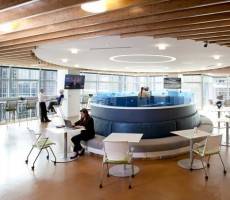October 9, 2014
BCO announces winners of national awards for Britain’s best workplaces
 The BCO has announced the winners of its prestigious annual National Awards to honour what it considers Britain’s best workplaces. The overall winner was Number One Riverside in Rochdale (above). The office, home to Rochdale Metropolitan Borough Council, was also recognised as the Best Corporate Workplace in the UK, and topped a list of six other award winners recognised for excellence in office space. Number One Riverside was singled out by the judges for its consolidation of the Council’s estate from 33 buildings into one. The project is also the centrepiece for the first phase of a major regeneration in the borough of Rochdale, ‘providing a new civic office that promotes new ways of working and creates a sense of community, engagement and social transparency.’ The building was commended by the judges for its incorporation of a range of public space alongside the workplace, including a library and cafe and customer service facilities.
The BCO has announced the winners of its prestigious annual National Awards to honour what it considers Britain’s best workplaces. The overall winner was Number One Riverside in Rochdale (above). The office, home to Rochdale Metropolitan Borough Council, was also recognised as the Best Corporate Workplace in the UK, and topped a list of six other award winners recognised for excellence in office space. Number One Riverside was singled out by the judges for its consolidation of the Council’s estate from 33 buildings into one. The project is also the centrepiece for the first phase of a major regeneration in the borough of Rochdale, ‘providing a new civic office that promotes new ways of working and creates a sense of community, engagement and social transparency.’ The building was commended by the judges for its incorporation of a range of public space alongside the workplace, including a library and cafe and customer service facilities.























October 6, 2014
A feeling of togetherness is essential and motivating, so why would we kill off the office?
by Mark Eltringham • Comment, Facilities management, Flexible working, Knowledge, Workplace design
It is still depressingly commonplace to read proclamations of the death of the office. These are usually appended to some survey or other about the rise of flexible working or a case study of a workplace devoid of desks (or, more likely, one in which none are pictured). Of course, the actual conclusion we can draw from such things is that the office as we once knew it is now dead or mutating into something else, but that’s true for every aspect of modern life. The constant factor that ensures offices will always exist, in some form or other is the human they serve. We know that because, as Tom Allen proved at MIT in the 1980s, people communicate less well the greater the physical distance between them. Now new research from Stanford University shows how the very idea of ‘togetherness’ can have a significant impact on the way people perform. The study, by researchers Priyanka Carr and Gregory Walton was published in the Journal of Experimental Social Psychology and concluded that ‘social cues that signal an invitation to work with others can fuel intrinsic motivation’.
(more…)